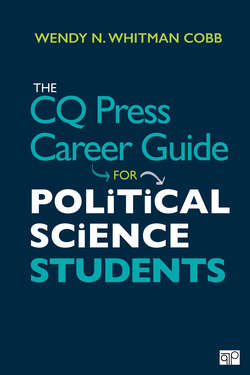Читать книгу The CQ Press Career Guide for Political Science Students - Wendy N. Whitman Cobb - Страница 11
На сайте Литреса книга снята с продажи.
The Bureaucracy
ОглавлениеNot only are there fifteen major cabinet departments in the federal government, but there are countless smaller agencies and offices that deal with everything from getting Social Security checks out on time to regulating the stock market. If there is something you’re interested in, chances are there’s a bureaucracy that’s involved in that policy area. You can be a federal agent with the FBI; the Bureau of Alcohol, Tobacco, Firearms and Explosives; or the Drug Enforcement Agency. You can be in the diplomatic corps of the Department of State or a doctor in Veterans Affairs. While many of these jobs may require more specialized education, there are any numbers of interesting jobs available.
The first stop when looking for a job with the federal government is the website USAJobs.gov, which provides an updated list of positions available and maintains an application system you would use to apply for those positions. (USA Jobs will be covered in further detail in Chapter 3.) USA Jobs provides a quick reference list of jobs available by major in college, and while political science does appear on the list, there are a number of other related career paths you can also consider:
— Business or commercial law
— Community planning/development
— Economics
— Global public policy
— History
— International trade, finance
— International relations
— Humanities
— Administration
— Statistics
— Urban planning
What is intriguing about many of these positions is that you don’t have to live in Washington, D.C., to pursue a career in the federal bureaucracy. Many agencies have offices located throughout the United States at which you can find appointments. Larger communities will often have Social Security offices, or if you live near a military post, you can find jobs on base or with the VA.
One line of bureaucratic work that you may find interesting is that of regulatory work. Examples of regulatory agencies include the Securities and Exchange Committee (SEC), which oversees banks and the stock market; the Environmental Protection Agency (EPA), which regulates environmental issues; the Food and Drug Administration (FDA), whose responsibilities include approving prescription drugs and overseeing food preparation and labeling; and the Federal Aviation Administration (FAA), which regulates airports and airlines. The main purpose of regulatory agencies is to take the laws that have been passed by Congress and turn them into actual workable rules that industry must follow. Not only do regulators write these rules, but it’s also up to them to investigate compliance with and enforcement of them.
Another example of interesting and exciting work can be found in the U.S. Foreign Service. The Foreign Service comprises the diplomats carrying out U.S. foreign and diplomatic policy around the world. An understanding of languages, cultures, and customs is requisite, but being a Foreign Service officer provides you with the opportunity to travel throughout the world and be stationed at one of hundreds of embassies or consulates, actively contributing to the mission of the United States at home and abroad. You can specialize in a functional area, like politics or economics, or in a geographical area, depending on your experience and education. Becoming a Foreign Service officer is a demanding and rigorous process, with the Department of State looking for those individuals who possess a wide array of knowledge and significant international experience. While there is no specific educational requirement to become a Foreign Service officer, a degree in political science can provide the political and economic background that is often tested in the Foreign Service Exam. Participation can lead to a fulfilling career, with the top echelons of the Foreign Service often serving important and high-placed diplomatic roles throughout the world.
Jobs in the bureaucracy, especially in the federal civil service, provide lots of room for career advancement. Once in, you can compete for higher pay and promotions, and if positions are available, you have the option of moving to different areas. Although bureaucrats are often maligned, these types of jobs are necessary for the everyday functioning of American government. It might seem boring, but the jobs these bureaucrats are carrying out can be exciting and rewarding.
